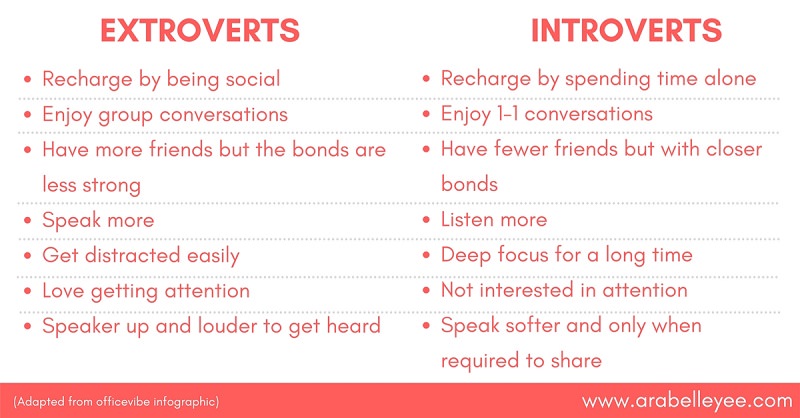I am an introvert, and for years I struggled with the prospect that many extroverts were achieving the fame, accolades and recognition I deeply desired. Yet I felt I did not have the enormous energy for people and self-promotion that extroverts naturally possessed, and was too sensitive a person to achieve this. The rift in my identity that this began to create in me engendered a passion to discover and address the question of how to get what I truly desired in life- those lofty ambitions that kept me up at night.
I am not alone. The truth is that Western society favours extroversion. We are generally taught that introverts are people who prefer to work and stay in the background. However, a major concern for many introverts is achieving a life worthy of recognition while being authentic and true to oneself in an extroverted world. Many worry that they don’t have the energy to do all that the extrovert does, but yet they deeply desire to be just as accomplished, recognised and celebrated. Indeed, both groups are equally endowed with the capacity for great achievement.
This describes what I like to call the dilemma of the ambitious introvert. In a sense it’s not a dilemma at all if we understand introversion and extroversion as sitting on the opposite ends of the same continuum. When we take this perspective the two concepts become more fluid and allow for varying degrees of introversion among the body of introverts and the same for extroverts. This perspective also allows that we stand at a fixed point in relation to each other on the continuum. This means the “ambitious introvert” is really one who is closer to extroversion on the continuum than others.
The use of the word ambitious does not imply that because I may dream of receiving Damehood from the Queen of England that another who desires to see all her kindergarten students grow up to be healthy and productive citizens is not ambitious. We are both ambitious. The word here is simply to describe those persons who presume to want to achieve anything in life.
Another point to consider is that, if we live long enough to grow old, as we get older, we will become less self-focused and more interested in others and contributing to society and the world. We develop into more well-rounded individuals, and the lines of introversion and extroversion are blurred to the onlooker who holds these concepts too rigidly. Our greater orientation to being other-centered may make the introvert appear more extroverted, and the growing need for introspection makes the extrovert appear more introverted, and I’d like to believe we meet each other at the idyllic middle.
If you really think about it, can you tell whether your 63 year old grandfather is an introvert or an extrovert? All you know and care is that he is a person. It may well be then that the contention of introversion and extroversion is a preoccupation of Gen-Yers, and Millennials, or the young.
So how can you mitigate the chasm between who you are and what you want to achieve? How can you get what you truly desire in life?
1. Know who you are
Introversion is the preference for introspection, and internal processing of information as a way of life. Introverts do their best thinking alone, and gain the most energy from quiet time with self, reflecting, processing, planning, and doing. Introverts think before they speak and do not readily share their values and beliefs unless prompted to do so. While extroverts gain energy from interacting with many people, introverts do not. Therefore the crux of the matter for introverts is their energy and how they manage it.
Complementary to this is to get a good sense of your personality type and how you function best, what motivates you and what your definition of success is. Doing a personality test with a tool like the Carl Jung’s 16 Personality types or the Myer-Briggs Type Indicator is an excellent place to start. From a place of knowledge you will be equipped to grow your vision.
2. Think like an extrovert
If you want to achieve like an extrovert, you must think like one. Ask yourself what would the extrovert do, and do the same. I do not recommend that you attempt to try to become an extrovert but rather take patterns from them. Without trying to show-up like one, you can adopt positive key lessons from observing them. They are not afraid to tell others about their skills, and abilities, and you shouldn’t be either. After all, you will not be recognised for work the world does not know that you do. So show up and introduce yourself.
3. Be strategic – cut to the chase
If you desire to be visible, strategy becomes key in making connections, networking, and visiblity. One of the ways we are taught to be visible is to be active on all social media platforms, show up in facebook groups constantly posting, commenting, and engaging to build momentum and visibility, in other words constant talking.
While extroverts excel at this and may relish it, most introverts find this an unappealing prospect – impractical, inefficient, and downright draining. Instead of doing this, I recommend that you shoot straight for what you desire. Only reach out to key persons, building rapport, informing them of the purpose for reaching out, seek to cultivate a relationship, and demonstrate how you see your contribution can add further value to what they are creating.
4. Create your own path
I believe the best way to achieve what you desire is to create it for yourself. Do not solely rely on more extroverted persons to facilitate you. Do not wait for people to book you, I recommend that you create your own opportunities, and establish yourself as the expert. This will give you a great sense of satisfaction, and a new level of self-respect.
Besides, people will still need a frame of reference for what you say you can do. Therefore there must be ready social evidence to support what you say about yourself. Go ahead and create your life.
5. Delegate to Extroverts
Even though you are great at planning, structuring, and organising behind the scenes, if achieving your dreams requires mining a Facebook group 20 hours a day in order to promote and sell your products and services, I recommend delegating all marketing and promotion activity like these to the experts (aka the extroverts). This frees you up to spend energy on the things you do best.
6. Go ahead and promote yourself
Promoting yourself, making connections, pitching how great you are at what you do is not sleazy or inauthentic, but quite practical and sensible. Not achieving your dreams can be woefully unsatisfying, and not an option for ambitious introverts.
So…go ahead and promote yourself. Tell the people with whom you desire to connect (and the world) how great you are at what you do, because you are highly introspective, thorough, caring, and precise, and that’s why you will add tremendous value to their lives.
7. Take consistent, methodical steps
Introverts are kings and queens of the methodical; we are great planners and can structure our lives very well. Therefore instead of trying to mimic the spontaneity of many extroverts, you should do what you do best, plan and construct. I recommend these four steps.
First, envision what you desire clearly. Then determine what it takes to get there, without making a judgment about how simple or difficult it is. Next, create a list of clear and simple action steps to match, and finally, methodically work your plan to achieve your dream.
8. Stay focused
As you observe your extroverted colleagues take action toward their goals, ever so often you may be tempted to act out like an extrovert, or may doubt that the path you are taking will get you to where you desire to be. But it’s important to stay focused and not be deterred from your path.
If you follow the above steps, then you will accomplish what you desire. Be authentic, be yourself, and do not force your energy beyond its limit. Be methodical and you will achieve what you truly desire.
 Lleuella Morris is a Personal Development Consultant based in Trinidad & Tobago. She creates tools, techniques, systems, and frameworks to grow and develop people, bringing them a greater understanding of themselves, develop their capacity, and help them solve difficult ‘thorn-in-the-flesh’ existential life issues. She specialises in Personality and Personal Growth and enjoys bringing new knowledge and perspective on old issues to change outdated thinking and promote emotional and cognitive well-being. You’ll find Lleuella at AMZ Consulting Company Limited.
Lleuella Morris is a Personal Development Consultant based in Trinidad & Tobago. She creates tools, techniques, systems, and frameworks to grow and develop people, bringing them a greater understanding of themselves, develop their capacity, and help them solve difficult ‘thorn-in-the-flesh’ existential life issues. She specialises in Personality and Personal Growth and enjoys bringing new knowledge and perspective on old issues to change outdated thinking and promote emotional and cognitive well-being. You’ll find Lleuella at AMZ Consulting Company Limited.




 Arabelle Yee
Arabelle Yee 